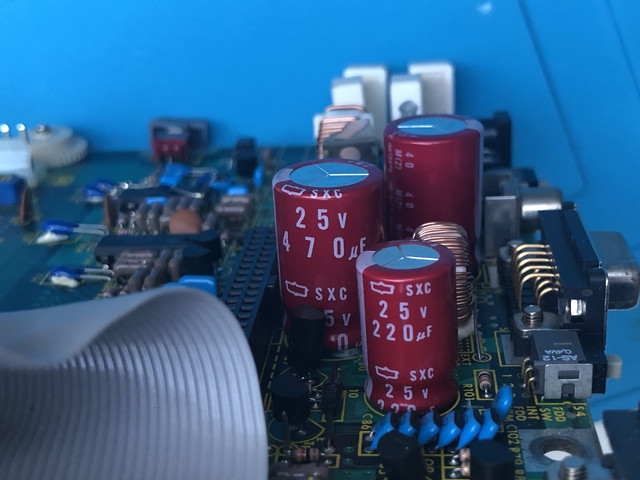I'm trying ro repair a very vintage Toshiba T1100 "the first laptop ever" circa 1984.
This is a 80c88 with 256KB of ram, no hard disk. Boots a DOS2.11 on floppy.
The unit is in pristine state externally and internally, it suffered minor leakage from the battery but i've cleaned it and neutralized.
However it POSTs merely one time out of 10.
So the unit "works" (and boots from floppy etc) it's just extremely unreliable.
This kind of ancient unit powers out of the battery, I mean, it does not work without battery, and a bunch of buck-boost DC-DC converter generate voltages rails for it ( +5,-5,+12V,-12V )
I've read at other places (vcf) that these are kinda difficult to repair, T1100/T1200 are a bit of cursed generation of laptops, and often end up in the recycle bin. There is no schematic to help either.

I've completely redone the battery, and could now be considered as new.
I've tested all rails and they "seem" ok (see above), the voltage is fine but there is a bit of ripple; not much.

Asking the "cap" experts here ; would you think THAT level of ripple could cause an issue, or am I wasting my time recapping the thing to get better ?

The lower two are -5 and -12V, they look "acceptable" to me.
The upper two are +12 and +5V (the most important one, in yellow)
Basically i've got let's say 100mV of 33Khz ripple on the +5V rail, this is "the max of the specs" according to the maintenance manual (yes, PCs had manuals with THAT level of detail at the time...)
There are basically 3 big electrolytes. Nippon Che-Con SXC (low-Z), I unsoldered one of them and it's perfect at the ESR meter.
These things just don't die. "They don't make them like they used to"
Joke apart ; if they are out of specs, it's only slightly. They are not "dead" or "worthy of replacement" by any means I can measure.

As I've never really looking at DC-DC converters, or what is an "acceptable" level of ripple, I'd like to read your opinions.
The entire PC is made out of 74HC logic (cmos - new at the time) which might be sensitive to ripple (not even sure).
I'm all in for a recap but I just want to understand what I do, I won't blindly unsolder things out of such a rare piece and hope for luck...
This is a 80c88 with 256KB of ram, no hard disk. Boots a DOS2.11 on floppy.
The unit is in pristine state externally and internally, it suffered minor leakage from the battery but i've cleaned it and neutralized.
However it POSTs merely one time out of 10.
So the unit "works" (and boots from floppy etc) it's just extremely unreliable.
This kind of ancient unit powers out of the battery, I mean, it does not work without battery, and a bunch of buck-boost DC-DC converter generate voltages rails for it ( +5,-5,+12V,-12V )
I've read at other places (vcf) that these are kinda difficult to repair, T1100/T1200 are a bit of cursed generation of laptops, and often end up in the recycle bin. There is no schematic to help either.

I've completely redone the battery, and could now be considered as new.
I've tested all rails and they "seem" ok (see above), the voltage is fine but there is a bit of ripple; not much.

Asking the "cap" experts here ; would you think THAT level of ripple could cause an issue, or am I wasting my time recapping the thing to get better ?

The lower two are -5 and -12V, they look "acceptable" to me.
The upper two are +12 and +5V (the most important one, in yellow)
Basically i've got let's say 100mV of 33Khz ripple on the +5V rail, this is "the max of the specs" according to the maintenance manual (yes, PCs had manuals with THAT level of detail at the time...)
There are basically 3 big electrolytes. Nippon Che-Con SXC (low-Z), I unsoldered one of them and it's perfect at the ESR meter.
These things just don't die. "They don't make them like they used to"
Joke apart ; if they are out of specs, it's only slightly. They are not "dead" or "worthy of replacement" by any means I can measure.

As I've never really looking at DC-DC converters, or what is an "acceptable" level of ripple, I'd like to read your opinions.
The entire PC is made out of 74HC logic (cmos - new at the time) which might be sensitive to ripple (not even sure).
I'm all in for a recap but I just want to understand what I do, I won't blindly unsolder things out of such a rare piece and hope for luck...